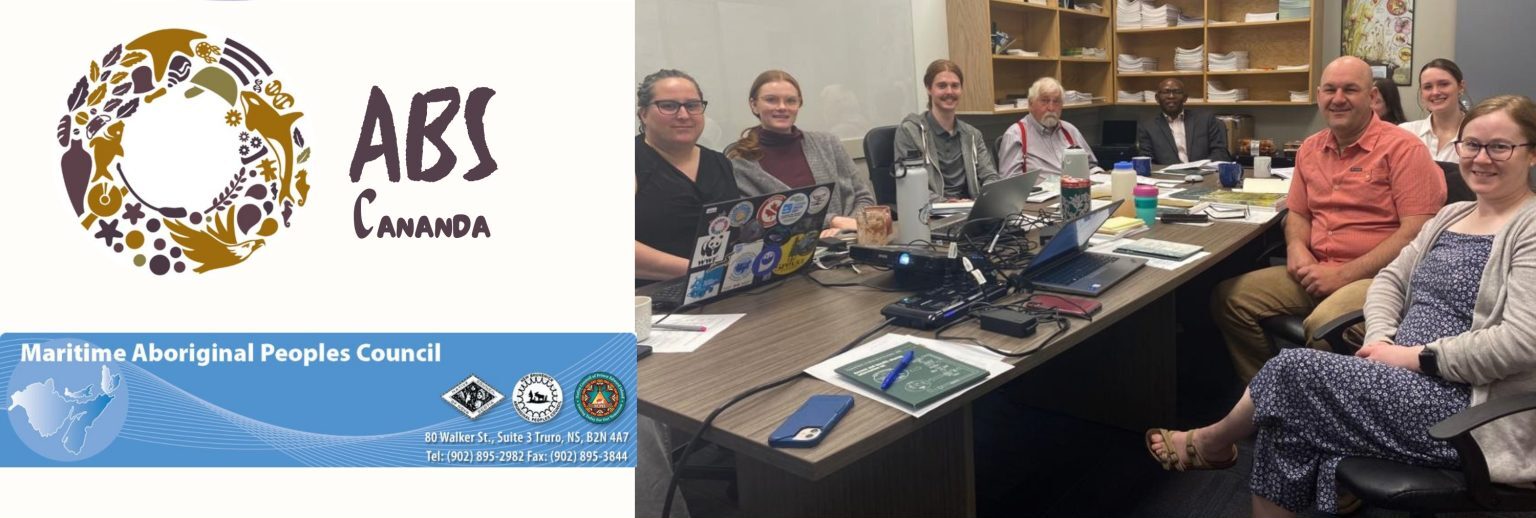MAPC-ABS Canada 2003 Workshop and Retreat
May 15-16: The Maritime Aboriginal Peoples Council (MAPC) and ABS Canada concluded their 2023 Annual Retreat and Workshop in Truro, NS. The objectives were to review the current national and international progress on the implementation of the 3rd pillar of the Convention on Biological Diversity (CBD) – the fair and equitable sharing of the benefits arising out of the utilization of genetic resources, a.k.a., Access & Benefit Sharing (ABS) – and to renew collaborations and efforts to ensure that Indigenous Peoples in Canada are involved in the ABS policy-making, practice and opportunities.
This year’s retreat and workshop was held in a bimodal format. It was supported and resourced internationally and nationally by eminent resource persons including acclaimed ABS scholar, Professor Daniel Robinson (University New South Wales, Australia), Preston Hardison (former representative of the Tulalip Tribes, USA and Policy Advisor of the Tebtebba Foundation of the Philippines), Catrina Caceres and Kate Davis (both of Environmental and Climate Change Canada’s International Biodiversity Policy Section), Joshua McNeely (Director of Environment, Congress of Aboriginal Peoples), Roger Hunka (retired Director of Intergovernmental Affairs, MAPC), Vanessa Mitchell, Executive Director of the Maritime Aboriginal Aquatic Secretariat and Professor Chidi Oguamanam (Director of ABS Canada).
Our Partnership Initiatives on ABS
Mr. Hunka and Professor Oguamanam took the liberty of institutional memory to trace the enduring partnership of the MAPC and ABS Canada which started around 2007 at Dalhousie University. The partnership is credited with two most influential Aboriginal position statements on ABS in Canada. The first is the 2011 Iskenisk Declaration on the Access, Use and Fair and Equitable Sharing of the Benefits Arising Out of the Utilization of Genetic Resources and Associated Traditional Knowledge in Canada and the 2015 Petkoutkoyek Statement on the Access, Use, and Fair and Equitable Sharing of Benefits Arising Out of the Utilization of Genetic Resources and Associated Traditional Knowledge in Canada. The duo also noted that the MAPC-ABS Canada partnership was instrumental to nationwide focus groups on ABS that sampled Indigenous peoples’ expectations from ABS, and a first major collaborative publication on the subject in the context of reconciliation: Genetic Resources, Justice and Reconciliation: Canada and Global Access and Benefit Sharing, 2019. The two organizations have kept the resolve in sustaining consciousness about ABS even though Canada dropped the ball on the subject since 2012 for lack of political will.
Canada Dropping the ABS Ball
Resource persons’ presentations and interventions underscored the history and rationale for ABS internationally through the 1992 Rio Summit on the Environment that resulted in, among other instruments, the Convention on Biological Diversity (CBD) and its subsequent Nagoya Protocol of 2010. The latter focuses on the implementation of the third objective of the CBD. They lamented that despite being the host of the Secretariat of the CBD and despite earlier false starts in its attempt to implement ABS, Canada dropped the ball on the subject. There was a sense of convergence of opinion that the hiatus on ABS in Canada is no longer feasible for many reasons.
Pressure to Revive ABS
First, many of Canada’s allies such as New Zealand, Australia and the EU have taken significant steps to implement ABS. In the case of Australia, even though the country has yet to give its accession to the protocol, it has invested, at federal and state levels, in its implementation. This is evident from the ABS permits issued in Australia based on information from the ABS Clearing House. Australia appears set to ratify the Nagoya Protocol as a formality even as it has been implementing the protocol for some time now. The regional implementation of ABS in the EU now results in researchers and corporations from the region inquiring from Canada on how their activities in Canada could be ABS-compliant pursuant to Nagoya Protocol. Such a situation is now a source of external pressure and embarrassment to Canada, which has yet to implement the Nagoya Protocol.
Second, Canada has since withdrawn its 2007 reservation on the United Nations Declaration on the Rights of Indigenous Peoples (UNDRIP). It has also embarked on an elaborate program of reconciliation. One of the hallmarks of the reconciliation agenda is the 2021 United Nations Declaration of the Rights of Indigenous Peoples Act (UNDA) through which Canada purports to domesticate and implement the UNDRIP. ABS is indirectly implicated in the implementation of UNDRIP through the overarching logic of Article 8(j) of the CBD and Articles 11, 12, 31, etc. of the UNDRIP which are advanced by the logic of ABS.
Third, as part of international pressure, the issue of ABS is implicated in the new dynamic of dematerialization of genetic resources. This is specifically through digital sequence information (DSI), which is now being mainstreamed into the Kunming-Montreal Global Biodiversity Framework being a result of the 15th meeting of the CBD Conference of Parties (COP-15). It is hard to imagine how Canada can be a genuine actor in the implementation of the Global Biodiversity Framework and in contributing to negotiations for a new global multilateral framework for the sharing of benefits arising out of the utilization of DSI when Canada continues to shy away from domestic implementation of ABS.
Practical Cases of ABS
Professor Robinson sought to debunk the view of many ABS naysayers by walking his audience through several practical cases and case studies of successful implementation of ABS with resultant benefits for Indigenous Peoples and Local Communities (IPLCs). Most of such cases were drawn from the Pacific region where the professor is mainly involved. However, he also provided examples from other regions which demonstrate that with the right political will, ABS can be tailored to contribute to the empowerment of Indigenous Peoples and Local Communities in specific national contexts.
Digital Sequence Information (DSI) as ABS Game Changer
While lamenting Canada’s unsustainable and unjustifiable lack of interest in implementing ABS, Professor Oguamanam drew attention to the hi-technological and scientific developments in the life sciences that have changed the original landscape of ABS. After identifying such new dynamics, he focused emphatically on DSI. He demonstrated how DSI has spurred the dematerialization of genetic resources and their transformation into digital information stored in global databases. According to him, this game-changing development has fundamentally disruptive effects on the operational architecture of ABS under the CBD, the Nagoya Protocol and cognate regimes. He noted that IPLCs are not adequately represented in the nascent attempt to develop a governance framework for DSI in the context of biodiversity conservation, sustainable use and ABS.
Indigenous Voice at WIPO-IGC Diplomatic Conference on Genetic Resources
In his own contribution, Preston Hardison isolated core sticking issues from the most advanced track of negotiations at the World Intellectual Property Organization – Intergovernmental Committee (WIPO-IGC), which is the genetic resources text. Hardison noted that negotiation dynamics and diplomatic exigencies have resulted in a highly narrow text on genetic resources. Even in its narrowed form, the genetic resources text which is now being primed for the 2024 Diplomatic Conference of WIPO, has several unresolved issues, including public domain, the term limit for traditional knowledge, databases, beneficiaries, disclosure of origin and sources (which relates to ABS) and the question of a tiered approach to traditional knowledge. While the Indigenous Caucus of WIPO-IGC has been pragmatic as honest stakeholders, Hardison indicated that the nature of representation for Indigenous Peoples at the forthcoming Diplomatic Conference is a source of concern. According to him, while the Indigenous Caucus does not have the status of a sovereign member state, the core subject matter for WIPO-IGC is one that affects the life, livelihood, and survival of Indigenous peoples. He hoped that WIPO and member states will fashion out a fair and equitable procedural process for effective participation of Indigenous people at the anticipated Diplomatic Conference.
Resolution: Urgency for Canada to Implement the Nagoya ABS Protocol
Before the workshop adjourned to its strategy and planning session the following day, the participants at the MAPC-ABS Canada workshop resolved as follows:
- There is both external and internal urgency for Canada to pick up the ball it dropped on the adoption of the Nagoya Protocol and development of a national ABS policy and framework. Now is a prime opportunity to advance the ABS discussion in Canada, as it embarks upon drafting a new National Biodiversity Strategy and Action Plan in response to the Global Biodiversity Framework
- As pioneering organizations that have championed Aboriginal expectations and interests in ABS, MAPC and ABS Canada must remain resolute to ensure that Canada develops a response on ABS that recognizes and protects Indigenous Peoples’ rights to genetic resources and associated traditional knowledge and which recognizes the potential of ABS as one path towards reconciliation.
- There is need for the Indigenous Peoples of Canada to be united above their differences and put up a single front to ensure that Canada implements ABS.
- Indigenous peoples are to intensify effort and seek out genuine partners to ensure that they make informed interventions in relevant forums where ABS and new technological developments are being explored, with special interest in the emergent debate over a DSI governance framework.
- ABS is cross-cutting subject matter and efforts must be intensified to engage relevant departments and agencies of government, at federal, provincial, territorial and all other levels, including but not limited to Environment and Climate Change Canada, Innovation, Science and Economic Development Canada, Global Affairs Canada, Justice Canada, Crown-Indigenous Relations and Northern Affairs Canada, Natural Resources Canada, Agriculture and Agri-Food Canada and the Tri-Council agencies (Canadian Institutes of Health Research, Natural Sciences and Engineering Research Council of Canada, and Social Sciences and Humanities Research Council).
- Given the disruptive effect of science and technologies, especially DSI, on the original design of ABS, now is perhaps a better time for Canada to take advantage of latecomer effect and design a national ABS process leveraging developments on multiple forums on the subject, including CBD, WHO, FAO, etc.
This post first appeared on ABS Canada.










